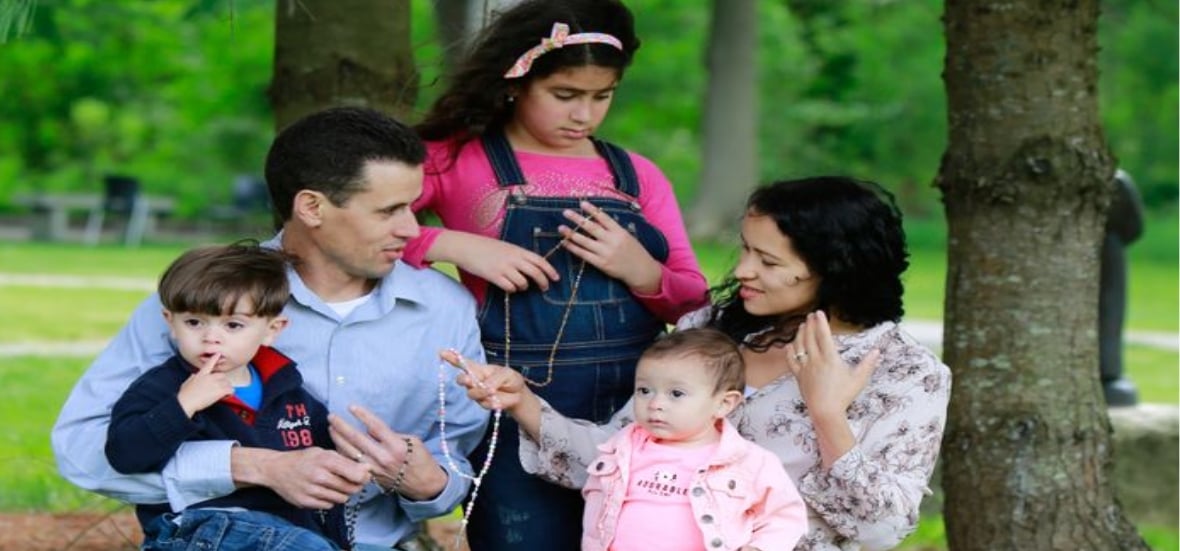
Katie Fitzgerald shares strategies her family uses to help children understand what Catholics believe about death and eternal life.
Two years ago, my father passed away 15 months after suffering a serious stroke. My second child was just shy of three years old at the time, and she surprised everyone at the wake with the way she walked right up to the casket, sat down on the kneeler, and visited with Grandpa. More recently, this same child has commented about an elderly family friend: “When he dies, I’m going to pray for him because I love him.”
These instances of matter-of-factness in the face of death have caused me to reflect on what has led this child -- and indeed, all of my three oldest children -- to feel so comfortable with the idea of dying. As I’ve thought about it, I have come up with several things I think my husband and I have done as parents to encourage our kids’ well-adjusted attitudes about death. During this month dedicated to the Holy Souls, I hope these tips will be useful for helping others talk about death with their young children.
I think the most influential thing we have done is to allow discussion of death. I think sometimes there is an instinct to protect kids from knowledge of death because hearing about it might somehow damage their innocence, or cause them to be sad, but we have been forthcoming with our kids and so far, this has been a wise choice. When my kids ask questions about decades-old family photos, for example, we don’t shy away from mentioning that a certain relative shown in a photo has died.
We also don’t sugarcoat the answers to questions like “Can children die?” We give the information calmly and gently, without hesitation or euphemism, and the kids accept it in the same way. We always make sure to frame the discussion with a hopeful message, that Jesus has made it possible for us to have hope of eternal life, and we emphasize that we can show our love for the dead by praying that they will go to heaven.
We never definitively say that someone who has died is in heaven. Rather, when we hear of a death in our community or extended family, we make a point of praying for the deceased and we explain that sometimes people need to get prepare a bit more before entering heaven and we can help them by our prayers.
Another thing we decided to do was to take our kids with us to wakes and funerals, even as babies and toddlers. While I know they don’t fully understand everything that happens during either of these events, wakes and Masses of Christian burial provide a predictable and systematic way for us to say goodbye to those who have died. For kids, who thrive on structure and routine, internalizing this process helps make death feel less earth-shattering. It gives them a way to process the loss of a loved one in light of the Church’s hope that those who have died will make it to heaven.
Though my kids’ first funeral ended up being their grandfather’s, I would not have hesitated to take them to a funeral for a less close relative in order to break the ice associated with the experience and to help them understand the earthly events that take place surrounding a death.
We also focus quite a bit on the idea of sainthood. As much as possible, we try to read aloud about a saint every day. When we do, we remind our kids that saints were once on Earth just like us, but that they have now gone to Heaven with Jesus. As the kids find themselves drawn to particular saints, they begin to comment on how much they want to meet them someday. They also play with saint-themed toys, such as peg dolls and Shining Light Dolls, that make them see the members of the Church Triumphant as good friends who just happen not to be on this Earth anymore.
Whereas I was fearful of the dead returning as ghosts as a child, my kids embrace the deceased as kind and loving souls with joyful dispositions. Focusing on saints also helps to avoid the mistaken idea kids can sometimes absorb from our culture that those who die become angels.
Finally, we also talk frequently about people we know who have died. I mention my late father in casual conversation almost daily, commenting on what he might have said in a certain situation or how he might have enjoyed something the kids have done. As I said to a friend months after my father’s death, the afterlife is less intimidating to me now because I know someone there. It is harder for kids to fear death when they have such a strong connection to someone who has died. Keeping Grandpa on our minds also means we think to pray for him much more often, thus hopefully shortening his time in purgatory!
Talking to kids about death makes them less likely to be shocked when a death occurs in their family or community. They will still be sad, of course, but because they have an awareness that people can and will die, they will be better equipped to process that sadness, and to rejoice in the knowledge that their loved one might very well be on the way to paradise.
.jpg?width=3840&name=20170603FatherPeytonAnniversaryMass%20(172).jpg)
Copyright 2020 Katie Fitzgerald
Image copyright 2017 Holy Cross Family Ministries. All rights reserved.
About the Author

Katie Fitzgerald
Katie Fitzgerald is a former children's librarian turned homeschooling mom. She and her librarian husband live in Maryland with their five children: three big sisters and a set of boy/girl twins. She blogs about homeschooling and reading at ReadAtHomeMom.com and writes short fiction, some of which appears in online magazines and print anthologies. Connect with her on Instagram @katiefitzstories.


.png?width=1806&height=731&name=CatholicMom_hcfm_logo1_pos_871c_2728c%20(002).png)
Comments